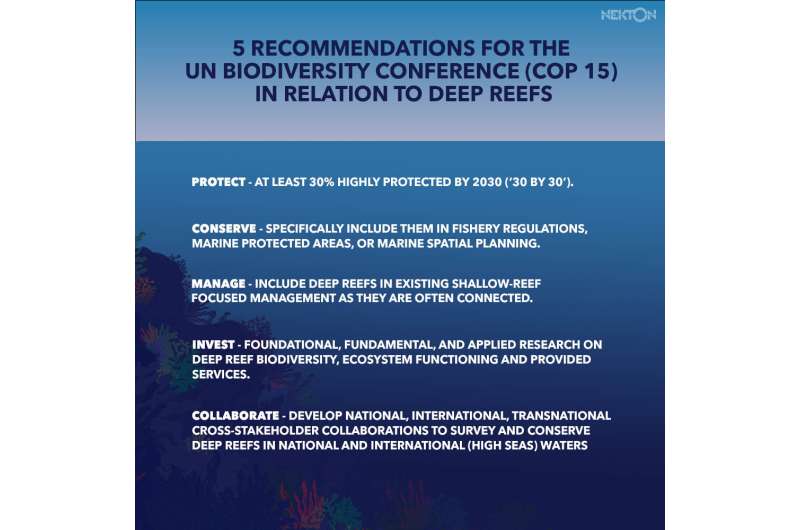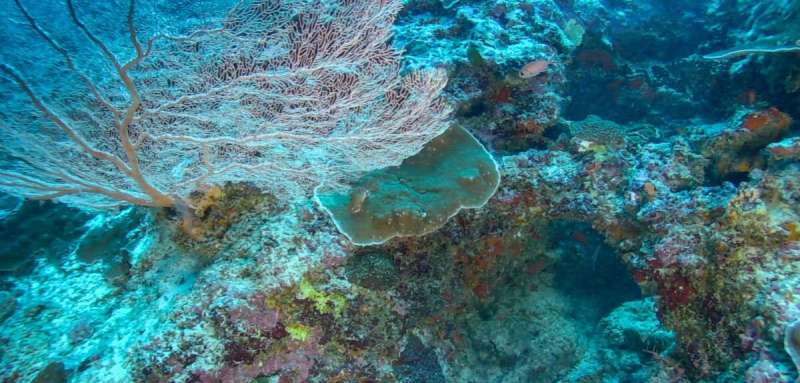The researchers urge policy makers to use the COP15 summit to agree to these recommendations. Credit: University of Oxford
University of Oxford researchers have contributed to a study which found that very few deep reefs have any form of protection, despite facing a multitude of threats. With the UN Biodiversity Conference COP15 currently underway, the researchers call on policy makers to put in place specific actions and targets to protect these biodiversity hotspots.
As world leaders, government negotiators, scientists and conservationists gather at the UN Biodiversity Conference, COP15, to agree to halt and reverse nature loss, an international team of marine scientists and conservationists have made an impassioned plea for the urgent conservation of deep reefs.
Their calls are based on a new study, recently published in the journal Conservation Letters, led by scientists from the University of Oxford, Nekton (a not-for-profit research institute), and the Western Indian Ocean. This confirms for the first time that deep reef habitats, notably in the Western Indian Ocean, are largely unprotected despite being under threat from a multitude of stressors, including overfishing, pollution, climate change and, in the near future, seabed mining.
Deep reefs (found below 30 m) provide essential ecosystem services for climate change resilience, ocean health, and food security whilst also acting as a refugia for organisms threatened in shallow water, including commercially important species. Despite this, deep reefs are barely protected, even though they have a larger geographic footprint than shallow reef systems. Furthermore, the scarcity of fish in shallow waters combined with modern deep sea fishing technologies is resulting in deep reefs being increasingly exploited by coastal communities who need fish for their food security.
Credit: University of Oxford
"We strongly encourage deep reefs to be included in conservation and sustainable management action to complement global targets, notably 30% protection of the global ocean by 2030," said the study's lead author, Dr. Paris Stefanoudis, a marine biologist at the University of Oxford's Department of Biology and a Research Scientist at Nekton. "Deep reefs are critical to a healthy marine ecosystem and face similar threats from overfishing, pollution, and climate change faced by the much-imperiled shallow reef system."
Covering more than 8% of the global ocean, the Western Indian Ocean is one of the least known, least protected, and most threatened marine regions of our planet. Shallow and deep coral reefs of the Western Indian Ocean are marine biodiversity hotspots with high numbers of species that are found nowhere else on Earth. They are essential to the region's 100 million people living within 100km of the coastline, including over three million people who are directly dependent on artisanal fishing for their livelihoods. The population is projected to double over the next 30 years, driving greater stressors on the ocean's biological capacity to support lives and livelihoods.
The scientific team has co-developed a new framework for conserving deep reefs including practical recommendations and specific actions for regional policy-makers, conservationists and scientists.
"To halt and reverse nature loss, the UN Biodiversity Conference, COP15 must prioritize the conservation of unique ecosystems such as deep reefs, one of the least protected ecosystems on Earth," stated co-author Professor Lucy Woodall, Professor of Marine Biology at the University of Oxford, Nekton Principal Scientist. "We hope our recommendations and actions will be useful for decision makers in the Western Indian Ocean, be applied within the new Western Indian Ocean regional policy and provide the springboard for deep reefs to become protected across the global ocean."
A deep reef in the Seychelles. Credit: Nekton
Co-author Athur Tuda, Executive Director of the Western Indian Ocean Marine Science Association, added, "To ensure a prosperous and resilient Western Indian Ocean, it is essential that deep reefs are no longer ignored by scientists and policy makers, and they must be specifically considered in conservation and management strategies."
The study, "Stakeholder-derived recommendations and actions to support deep-reef conservation in the Western Indian Ocean," has been published in the journal Conservation Letters.
More information: Paris V. Stefanoudis et al, Stakeholder‐derived recommendations and actions to support deep‐reef conservation in the Western Indian Ocean, Conservation Letters (2022). DOI: 10.1111/conl.12924
Journal information: Conservation Letters
Provided by University of Oxford

























